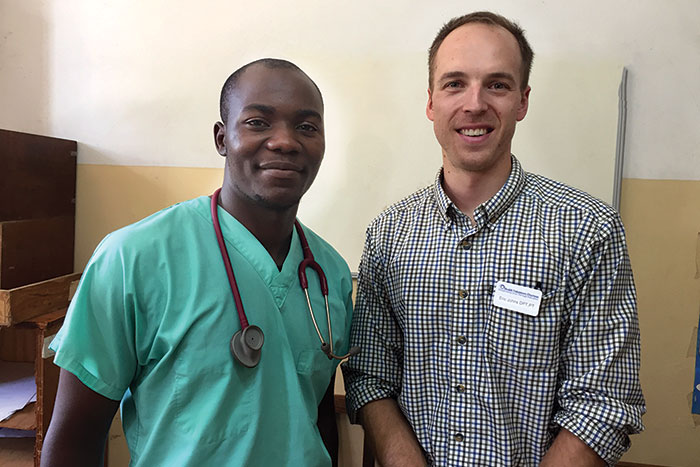A Rehabilitated Perspective

by Eric Johns '09
Five years into a career is a good time to pause and reflect. During my first few years working as a physical therapist in a rehabilitation hospital, I didn’t yet see the full value of my Dickinson education. Clinical settings are driven in part by highly specific protocols and procedures and hyperspecialization. While I love treating patients, there have been times I asked my jack-of-all-trades self if I would be a better fit for a different facet of health care. Or, if this has always been my calling, why didn’t I do one of those fasttrack programs at a big university that gets you to graduate school more efficiently?
While considering my career path, in fall 2017 I took on a new challenge. I spent a month teaching physical therapy students in Malawi. I traveled there alone and had the first week to orient myself to Malawian rehabilitation practice standards and create teaching experiences for the students. Resources and support were available—if I asked the right questions. Nothing else I’ve done in my life so far required such minute-to-minute diversity of thought: learning new methods of communication on the fly, making decisions with incomplete information and recalling facts learned long ago. (Yes, memorization is still essential today, when the internet isn’t available!) And of course I had to constantly reevaluate familiar patterns of teaching knowledge and skills within the context of a totally different culture. An American is unlikely to have even modest success teaching students and collaborating with faculty at a Malawian university without a basic understanding of how British postcolonial dynamics coupled with the country’s recent governmental changes shape its educational system. Recognizing and adapting a project to these factors is not something you learn in a clinical graduate program, but it is something you learn at Dickinson. Sitting in on a faculty meeting— sipping tea in a warm boardroom with Malawian, German and Australian rehabilitation educators—crosscultural communication was equally as vital as skills with wheelchair training or the ability to lecture on kinesiology. It was after my time in Malawi that I better understood just how well Dickinson had prepared me to apply my work to complex international settings.
As I think about goals for a hopeful 2019 return to Malawi and continue my usual physical therapy work in Philadelphia, I also consider my student loan repayment status five years postgraduation. A Dickinson education is a significant investment, especially for the son of an electrician. Many necessary conversations are taking place today around the country and, I’m sure, on college campuses, about escalating costs and the value of a liberal-arts education. I will be paying off my student loans for years to come, and I do it without regret. In life, the amount of sacrifice is often proportional to the value of the accomplishment; such is a Dickinson education. I look forward to seeing how the value of this education further reveals itself in the years to come.
Eric Johns ’09 earned a degree in biology before attending Drexel University for a doctor of physical therapy. While at Dickinson, He was on the Jive Turkeys Ultimate Frisbee team and studied abroad in Australia. He lives in Philadelphia with his wife, Rachael, and his son, Christopher. He works as a physical therapist for Good Shepherd Penn Partners and Moss Rehab and as a teaching assistant at Drexel. He traveled to Malawi in October 2017 to guest lecture at the University of Malawi’s physiotherapy program, via a project organized by Health Volunteers Overseas.
Read more from the fall 2018 issue of Dickinson Magazine.
TAKE THE NEXT STEPS
Published October 23, 2018